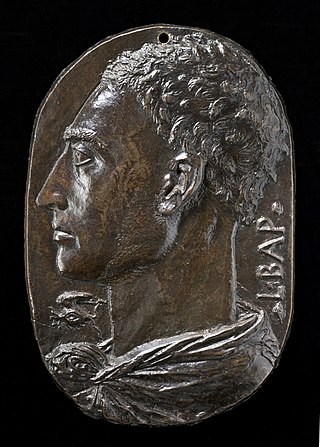Related Research Articles

Leon Battista Alberti was an Italian Renaissance humanist author, artist, architect, poet, priest, linguist, philosopher, and cryptographer; he epitomised the nature of those identified now as polymaths. He is considered the founder of Western cryptography, a claim he shares with Johannes Trithemius.

Domenico Passignano, born DomenicoCresti or Crespi, was an Italian painter of a late-Renaissance or Counter-Maniera (Counter-Mannerism) style that emerged in Florence towards the end of the 16th century.

Piero Camporesi was an Italian historian of literature and an anthropologist. He was a professor of Italian literature at the University of Bologna.

Bruno Zevi was an Italian architect, historian, professor, curator, author, and editor. Zevi was a vocal critic of "classicizing" modern architecture and postmodernism.
John Argyropoulos was a lecturer, philosopher and humanist, one of the émigré Greek scholars who pioneered the revival of classical Greek learning in 15th century Italy.
Alberto Melloni is an Italian church historian and a Unesco Chairholder of the Chair on Religious Pluralism & Peace, primarily known for his work on the Councils and the Second Vatican Council. Since 2020, he is one of the European Commission's Chief Scientific Advisors.

Nicholas Leonicus Thomaeus was a Venetian scholar and professor of philosophy as well as of Greek and Latin at the University of Padua.
Lucy Riall is an Irish historian. She was a professor of history at Birkbeck, University of London, and is currently a professor in the Department of History and Civilisation at the European University Institute in Florence.

Agostino Paravicini Bagliani is an Italian historian, specializing in the history of the papacy, cultural anthropology, and in the history of the body and the relationship between nature and society during the Middle Ages.

William John ("Bill") Connell is an American historian and holder of the Joseph M. and Geraldine C. La Motta Chair in Italian Studies at Seton Hall University. He is a leading specialist in Italian history, Early Modern European history and the history of Italian Americans, and he writes broadly on other topics. In 2019 he was named an Andrew Carnegie Fellow.

The hospital of San Giacomo in Augusta, also known as San Giacomo degli Incurabili was a historic hospital located in Rome.
Bianco di Santi alias Bianco da Siena or Bianco da Lanciolina was an Italian mystic poet and an imitator of Jacopone da Todi. He wrote several religiously-inspired poems (lauda) that were popular in the Middle Ages. First a wool carder, he eventually became a member of the poor Jesuates, founded by Giovanni Colombini.

Gaetano Cozzi was an Italian historian, professor at Padua University, and researcher with the Giorgio Cini Foundation and Fondazione Benetton Studi e Ricerche. He was a specialist in Venetian history, with special attention to the institutions, the relationship between law and society and the cultural environment.
The following is a timeline of the history of the city of Pistoia in the Tuscany region of Italy.
William Caferro is Gertrude Conaway Vanderbilt Professor of History & Professor of Classical and Mediterranean Studies at Vanderbilt University. His expertise is in medieval and Renaissance European history. His publications synthesize economic, military, social, literary, and historical trends.
Elena Brambilla was an Italian historian.
John Moulton Day was an American historian.

Timothy Christopher Verdon, is a Roman Catholic priest and Art Historian, specialized in Christian Sacred Art on which he has written numerous books and articles. He has organized international scholarly conferences and curated exhibitions in Italy and the USA. He was born in New Jersey, United States, and has lived in Italy for more than 50 years, now residing in Florence.

Ludovico Settala was an Italian physician who lived during the Renaissance.
Paolo Prodi was an Italian historian and politician.
References
- ↑ John Henderson. Birkbeck College. Retrieved 14 May 2015.